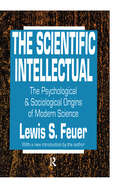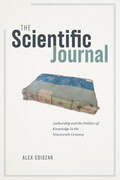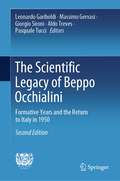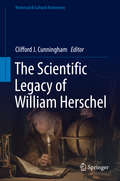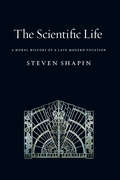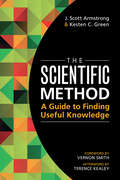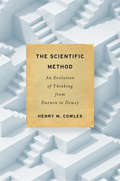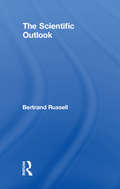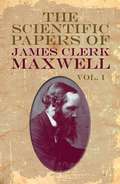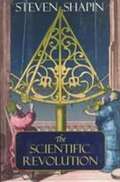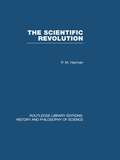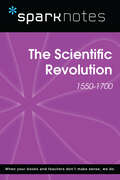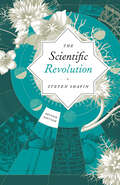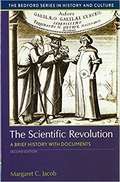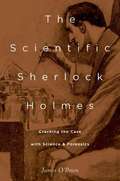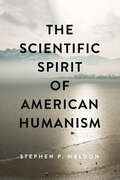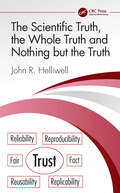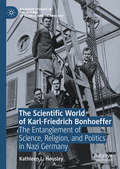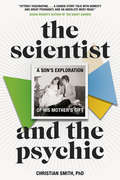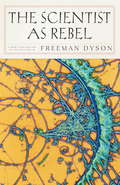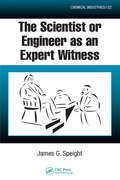- Table View
- List View
The Scientific Exploration of Venus
by Fredric W. TaylorVenus is the brightest 'star' in the night sky and it has been observed since ancient times. Often dubbed Earth's 'twin', it is the planet most similar to the Earth in size, mass and composition. There the similarity ends: Venus is shrouded by a dense carbon dioxide atmosphere, its surface is dominated by thousands of volcanoes and it lacks a protective magnetic field to shield it from energetic solar particles. So why isn't Venus more like Earth? In this book, a leading researcher of Venus addresses this question by explaining what we know through our investigations of the planet. Venus presents an intriguing case study for planetary astronomers and atmospheric scientists, especially in light of the current challenges of global warming, which supports, and potentially threatens, life on Earth. Scientifically rigorous, yet written in a friendly non-technical style, this is a broad introduction for students, and astronomy and space enthusiasts.
The Scientific Intellectual: The Psychological & Sociological Origins of Modern Science
by Lewis S. FeuerThe birth of modern science was linked to the rise in Western Europe of a new sensibility, that of the scientific intellectual. Such a person was no more technician, looking at science as just a job to be done, but one for whom the scientific stand-point is a philosophy in the fullest sense. In The Scientific Intellectual, Lewis S. Feuer traces the evolution of this new human type, seeking to define what ethic inspired him and the underlying emotions that created him.Under the influence of Max Weber, the rise of the scientific spirit has been viewed by sociologists as an offspring of the Protestant revolution, with its asceticism and sense of guilt acting as causative agents in the rise of capitalism and the growth of the scientific movement. Feuer takes strong issue with this view, pointing out how it is at odds with what we know of the psychological conditions of modern societies making for human curiosity and its expression in the observation of and experiment with nature.Feuer shows that wherever a scientific movement has begun, it has been based on emotions that issue in what might be called a hedonist-libertarian ethic. The scientific intellectual was a person for whom science was a 'new philosophy,' a third force rising above religious and political hatreds, seeking in the world of nature liberated vision, a intending to use and enjoy its knowledge. In his new introduction to this brilliantly readable volume, Professor Feuer reviews the book's critical reception and expands the scope of the original edition to include fascinating discussions of Francis Bacon, Thomas Edison, Charles Darwin, Thomas Hardy, and others. The Scientific Intellectual will be of interest to scientists and intellectual historians.
The Scientific Journal: Authorship and the Politics of Knowledge in the Nineteenth Century
by Alex CsiszarNot since the printing press has a media object been as celebrated for its role in the advancement of knowledge as the scientific journal. From open communication to peer review, the scientific journal has long been central both to the identity of academic scientists and to the public legitimacy of scientific knowledge. But that was not always the case. At the dawn of the nineteenth century, academies and societies dominated elite study of the natural world. Journals were a relatively marginal feature of this world, and sometimes even an object of outright suspicion.The Scientific Journal tells the story of how that changed. Alex Csiszar takes readers deep into nineteenth-century London and Paris, where savants struggled to reshape scientific life in the light of rapidly changing political mores and the growing importance of the press in public life. The scientific journal did not arise as a natural solution to the problem of communicating scientific discoveries. Rather, as Csiszar shows, its dominance was a hard-won compromise born of political exigencies, shifting epistemic values, intellectual property debates, and the demands of commerce. Many of the tensions and problems that plague scholarly publishing today are rooted in these tangled beginnings. As we seek to make sense of our own moment of intense experimentation in publishing platforms, peer review, and information curation, Csiszar argues powerfully that a better understanding of the journal’s past will be crucial to imagining future forms for the expression and organization of knowledge.
The Scientific Legacy of Beppo Occhialini: Formative Years and the Return to Italy in 1950
by Aldo Treves Leonardo Gariboldi Giorgio Sironi Massimo Gervasi Pasquale TucciThe thirtieth anniversary of the death of Beppo Occhialini, the cosmic-ray physicist associated among other things to the fundamental discoveries of the electron-positron pairs and of the pion thanks to his contributions to the development of the controlled cloud chamber and of new nuclear emulsions, is the occasion to publish his memoirs on the main events of his scientific life, which he dictated shortly before his death. This second edition of The Scientific Legacy of Beppo Occhialini takes us by the hand to appreciate the admiration if not the veneration he had for Patrick Blackett, the ironic rudeness of Lord Rutherford, or the troubled relationship with Cecil Powell. A particularly thorny aspect concerns the role played by some physicists during the Second World War and the way Occhialini elaborated the complex personal situations experienced by each of them. Occhialini’s memoirs are enriched by his short autobiography originally published as an encyclopedia entry in the 1970s. A selection of relevant historical studies and personal reminiscences mainly concerning his scientific activity before his coming to Milan is reproposed, together with some personal notes from friends and colleagues.
The Scientific Legacy of William Herschel
by Clifford J. CunninghamThis book presents a modern scholarly analysis of issues associated with England'smost famous astronomer, William Herschel. The world's leading experts onHerschel, discoverer of the planet Uranus, here offer their combined wisdom on manyaspects of his life and astronomical research. Solar system topics includecomets, Earth's Moon, and the spurious moons of Uranus, all objects whose observation was pioneered by Herschel. The contributors examine his study of thestructure of the Milky Way and an in-depth look at the development of the front view telescopes he built. The popular subject of extraterrestriallife is looked at from the point of view of both William Herschel and his sonJohn, both of whom had an interest in the topic. William's personal development through the educational system of the lateeighteenth-century is also explored, and the wide range of verse and satire invarious languages associated with his discoveries is collected here for thefirst time. Hershel worked at a time of incredible discovery, and his work is still highly regarded in the field. Here it is given a thorough investigation which puts into context and perspective his path breaking career.
The Scientific Life: A Moral History of a Late Modern Vocation
by Steven ShapinConventional wisdom has long held that scientists are neither better nor worse than anyone else, that personal virtue does not necessarily accompany technical expertise, and that scientific practice is profoundly impersonal. Shapin, however, here shows how the uncertainties attending scientific research make the virtues of individual researchers intrinsic to scientific work. Further, Shapin argues that the radical uncertainties of much of contemporary science have made personal virtues more central to its practice than ever before, and he also reveals how radically novel aspects of late modern science have unexpectedly deep historical roots.
The Scientific Method: A Guide to Finding Useful Knowledge
by J. Scott Armstrong Kesten C. GreenThe scientific method delivers prosperity, yet scientific practice has become subject to corrupting influences from within and without the scientific community. This essential reference is intended to help remedy those threats. The authors identify eight essential criteria for the practice of science and provide checklists to help avoid costly failures in scientific practice. Not only for scientists, this book is for all stakeholders of the broad enterprise of science. Science administrators, research funders, journal editors, and policymakers alike will find practical guidance on how they can encourage scientific research that produces useful discoveries. Journalists, commentators, and lawyers can turn to this text for help with assessing the validity and usefulness of scientific claims. The book provides practical guidance and makes important recommendations for reforms in science policy and science administration. The message of the book is complemented by Nobel Laureate Vernon L. Smith's foreword, and an afterword by Terence Kealey.
The Scientific Method: An Evolution of Thinking from Darwin to Dewey
by Henry M. CowlesThe surprising history of the scientific method—from an evolutionary account of thinking to a simple set of steps—and the rise of psychology in the nineteenth century. The idea of a single scientific method, shared across specialties and teachable to ten-year-olds, is just over a hundred years old. For centuries prior, science had meant a kind of knowledge, made from facts gathered through direct observation or deduced from first principles. But during the nineteenth century, science came to mean something else: a way of thinking. The Scientific Method tells the story of how this approach took hold in laboratories, the field, and eventually classrooms, where science was once taught as a natural process. Henry M. Cowles reveals the intertwined histories of evolution and experiment, from Charles Darwin’s theory of natural selection to John Dewey’s vision for science education. Darwin portrayed nature as akin to a man of science, experimenting through evolution, while his followers turned his theory onto the mind itself. Psychologists reimagined the scientific method as a problem-solving adaptation, a basic feature of cognition that had helped humans prosper. This was how Dewey and other educators taught science at the turn of the twentieth century—but their organic account was not to last. Soon, the scientific method was reimagined as a means of controlling nature, not a product of it. By shedding its roots in evolutionary theory, the scientific method came to seem far less natural, but far more powerful. This book reveals the origin of a fundamental modern concept. Once seen as a natural adaptation, the method soon became a symbol of science’s power over nature, a power that, until recently, has rarely been called into question.
The Scientific Outlook (Routledge Classics Ser.)
by Bertrand Russell'A scientific opinion is one which there is some reason to believe is true; an unscientific opinion is one which is held for some reason other than its probable truth.' - Bertrand RussellOne of Russell's most important books, this early classic on science illuminates his thinking on the promise and threat of scientific progress. Russell considers three questions fundamental to an understanding of science: the nature and scope of scientific knowledge, the increased power over nature that science affords, and the changes in the lives of human beings that result from new forms of science. With customary wit and clarity, Russell offers brilliant discussions of many major scientific figures, including Aristotle, Galileo, Newton and Darwin.With a new introduciton by David Papineau, King's College, London.
The Scientific Papers of James Clerk Maxwell, Vol. I
by James Clerk MaxwellOne of the greatest theoretical physicists of the 19th century, James Clerk Maxwell is best known for his studies of the electromagnetic field. The 101 scientific papers of this two-volume set, arranged chronologically, testify to Maxwell's profound scientific legacy and include the preliminary explorations that culminated in his most famous work, A Treatise on Electricity and Magnetism. One of the nineteenth century's most significant papers, "A Dynamical Theory of the Electromagnetic Field," appears here, along with similarly influential expositions of Maxwell's dynamical theory of gases. The author's extensive range of interests is well represented, from his discussions of color blindness and the composition of Saturn's rings to his essays on geometrical optics, ether, and protecting buildings from lightning. His less technical writings are featured as well, including items written for the Encyclopedia Britannica and Nature magazine, book reviews, and popular lectures. Striking in their originality, these papers offer a wealth of stimulating and inspiring reading to modern students of mathematics and physics.
The Scientific Renaissance 1450-1630
by Marie Boas HallWhile scientific inquiry has its roots in both Far Eastern and Indo-European cultures, the revolutionary ideas that made modern scientific achievements possible occurred initially in Europe. This stimulating, illuminating, and thoughtfully presented work explores the early stages of this scientific revolution, beginning with the rediscovery of Greek ideas in the mid-15th century and culminating with Galileo's brilliant Dialogue on the Two Chief Systems of the World in 1630. Noted historian of science Marie Boas Hall first gives a general account of scientific thought in the mid-1400s, then examines the Copernican revolution and the anatomical work of Vesalius and his contemporaries, the impact of chemical medicine and the efforts of the Swiss physician and alchemist Paracelsus. Also here are insightful discussions of Harvey's discovery of the circulatory system, the work of Kepler, the effects of Galileo's telescopic discoveries, and other topics. A series of accompanying illustrations -- among them a Ptolemaic map, examples of Renaissance engineering, and portraits of Francis Bacon, Tycho Brahe, Vesalius, Kepler, and Galileo -- enhance this scholarly and informative work. A valuable reference book for students of the history of science, The Scientific Renaissance 1450-1630 is "good, sound, academic stuff . . . interesting even to those for whom it is not required reading." -- New Statesman.
The Scientific Revolution
by Steven ShapinA historical exploration of the origins of the modern scientific worldview. The author rejects the idea that there was anything like a "revolution" in early modern science, instead asserting that scientific knowledge was advanced through social practices for social purposes, and was met as much with skepticism and rejection as with celebration and praise. Annotation c. by Book News, Inc. , Portland, Or.
The Scientific Revolution (Routledge Library Editions: History & Philosophy of Science)
by Peter HarmanOriginally published in 1983.This volume outlines some of the important innovations in astronomy, natural philosophy and medicine which took place in the sixteenth and seventeenth centuries, and shows how the transformation in world-view during the period was affected by broader historical terms. Themes such as the spread of Puritanism, the decline of witchcraft and magic, and the incorporation of science as an integral part of the intellectual milieu of late seventeenth-century England.
The Scientific Revolution (SparkNotes History Notes)
by SparkNotesThe Scientific Revolution (1550-1700) (SparkNotes History Note) Making the reading experience fun! SparkNotes History Guides help students strengthen their grasp of history by focusing on individual eras or episodes in U.S. or world history. Breaking history up into digestible lessons, the History Guides make it easier for students to see how events, figures, movements, and trends interrelate. SparkNotes History Guides are perfect for high school and college history classes, for students studying for History AP Test or SAT Subject Tests, and simply as general reference tools.Each note contains a general overview of historical context, a concise summary of events, lists of key people and terms, in-depth summary and analysis with timelines, study questions and suggested essay topics, and a 50-question review quiz.
The Scientific Revolution (science.culture)
by Steven Shapin“There was no such thing as the Scientific Revolution, and this is a book about it.” With this provocative and apparently paradoxical claim, Steven Shapin begins his bold, vibrant exploration of the origins of the modern scientific worldview, now updated with a new bibliographic essay featuring the latest scholarship. “An excellent book.”—Anthony Gottlieb, New York Times Book Review “Timely and highly readable. . . . A book which every scientist curious about our predecessors should read.”—Trevor Pinch, New Scientist “Shapin's account is informed, nuanced, and articulated with clarity. . . . This is not to attack or devalue science but to reveal its richness as the human endeavor that it most surely is. . . . Shapin's book is an impressive achievement.”—David C. Lindberg, Science “It's hard to believe that there could be a more accessible, informed or concise account. . . . The Scientific Revolution should be a set text in all the disciplines. And in all the indisciplines, too.”—Adam Phillips, London Review of Books
The Scientific Revolution: A Brief History with Documents (The Bedford series in History and Culture)
by Margaret JacobThe Scientific Revolution highlights the difficulty of engaging, discarding, or assimilating religious paradigms in the course of scientific development. Jacob's introduction outlines the trajectory of the Scientific Revolution and argues that the revival of ancient texts in the Renaissance and the upheaval of the Protestant Reformation paved the way for science.
The Scientific Sherlock Holmes: Cracking the Case With Science and Forensics
by James O'BrienOne of the most popular and widely known characters in all of fiction, Sherlock Holmes has an enduring appeal based largely on his uncanny ability to make the most remarkable deductions from the most mundane facts. The very first words that Sherlock Holmes ever says to Dr. Watson are, "How are you? You have been in Afghanistan, I perceive. " Watson responds, "How on earth did you know that?" And so a crime-solving legend is born. In The Scientific Sherlock Holmes, James O'Brien provides an in-depth look at Holmes's use of science in his investigations. Indeed, one reason for Holmes's appeal is his frequent use of the scientific method and the vast scientific knowledge which he drew upon to solve mysteries. For instance, in heart of the book, the author reveals that Holmes was a pioneer of forensic science, making use of fingerprinting well before Scotland Yard itself had adopted the method. One of the more appealing aspects of the book is how the author includes real-world background on topics such as handwriting analysis, describing how it was used to capture the New York Zodiac killer and to clinch the case against the Lindbergh baby kidnapper. Sherlock Holmes was knowledgeable about several sciences, most notably chemistry. Therefore the book takes a close look at Holmes the chemist and discusses, for example, chemical poisons such as carbon monoxide, chloroform, and Prussic acid (the historical name for hydrogen cyanide). The author also debunks Isaac Asimov's famous assertion that Holmes was a blundering chemist. In addition, the book discusses mathematics, physics, biology, astronomy, meteorology, and geology, always in the context of Holmes's exploits. Sherlock Holmes continues to fascinate millions of readers and movie goers alike. The Scientific Sherlock Holmes is a must-read for the legion of fans of this most beloved of all fictional detectives.
The Scientific Spirit of American Humanism (Medicine, Science, and Religion in Historical Context)
by Stephen P. WeldonThe story of how prominent liberal intellectuals reshaped American religious and secular institutions to promote a more democratic, science-centered society.Recent polls show that a quarter of Americans claim to have no religious affiliation, identifying instead as atheists, agnostics, or "nothing in particular." A century ago, a small group of American intellectuals who dubbed themselves humanists tread this same path, turning to science as a major source of spiritual sustenance. In The Scientific Spirit of American Humanism, Stephen P. Weldon tells the fascinating story of this group as it developed over the twentieth century, following the fortunes of a few generations of radical ministers, academic philosophers, and prominent scientists who sought to replace traditional religion with a modern, liberal, scientific outlook. Weldon explores humanism through the networks of friendships and institutional relationships that underlay it, from philosophers preaching in synagogues and ministers editing articles of Nobel laureates to magicians invoking the scientific method. Examining the development of an increasingly antagonistic engagement between religious conservatives and the secular culture of the academy, Weldon explains how this conflict has shaped the discussion of science and religion in American culture. He also uncovers a less known—but equally influential—story about the conflict within humanism itself between two very different visions of science: an aspirational, democratic outlook held by the followers of John Dewey on the one hand, and a skeptical, combative view influenced by logical positivism on the other. Putting America's distinctive science talk into historical perspective, Weldon shows how events such as the Pugwash movement for nuclear disarmament, the ongoing evolution controversies, the debunking of pseudo-science, and the selection of scientists and popularizers like Carl Sagan and Isaac Asimov as humanist figureheads all fit a distinctly American ethos. Weldon maintains that this secular ethos gained much of its influence by tapping into the idealism found in the American radical religious tradition that includes the deism of Thomas Paine, nineteenth-century rationalism and free thought, Protestant modernism, and most important, Unitarianism. Drawing on archival research, interviews, and a thorough study of the main humanist publications, The Scientific Spirit of American Humanism reveals a new level of detail about the personal and institutional forces that have shaped major trends in American secular culture. Significantly, the book shows why special attention to American liberal religiosity remains critical to a clear understanding of the scientific spirit in American culture.
The Scientific Truth, the Whole Truth and Nothing but the Truth
by John R. HelliwellThere is a limited understanding amongst scientists, students, and the public about realizing trust in scientific findings. This should be a paramount objective. Scientists and the public need to know more about the link between the philosophy of science and science research methods. There is a limited understanding of why accuracy is important and that it is not the same as precision. Also, there is often the need to be pragmatic and so measure an approximation of a real system, and the classic case is reductionism in biology versus whole organism biology. The author brings these topics together in terms of trusting in science.Features Covers how scientific truth is perceived and increases the preparedness of early career scientists. Examines the relatively new field of machine learning and artificial intelligence as applied to crystallography databases in biology and chemistry for new discoveries. Describes the major changes in digital data archiving and how vast “raw data” archives are being increasingly developed for machine learning and artificial intelligence as well as complete truth. This unique volume will be of interest to pre-university and university undergraduate students, principally in science. Presents scientific research examples from physics, chemistry, and biology together with their methodologies.
The Scientific World of Karl-Friedrich Bonhoeffer: The Entanglement Of Science, Religion, And Politics In Nazi Germany (Palgrave Studies in the History of Science and Technology)
by Kathleen L. HousleyIn twentieth-century Germany, Karl-Friedrich Bonhoeffer rose to prominence as a brilliant physical chemist, even as several of his relatives—Dietrich Bonhoeffer among them—became involved in the resistance to Hitler, leading to their executions. This book traces the entanglement of science, religion, and politics in the Third Reich and in the lives of Karl-Friedrich, his family and his colleagues, including Fritz Haber and Werner Heisenberg. Nominated for the Nobel Prize, Karl-Friedrich was an expert on heavy water, a component of the atomic bomb. During the war, he was caught in the middle between relatives who were trying to kill Hitler and friends who were helping Hitler build a nuclear weapon. Karl-Friedrich emerges as a complex figure—an agnostic whose brother was a renowned theologian, and a chemist who both reluctantly advised German nuclear scientists and collaborated with Paul Rosbaud, a spy for the British. Illuminating the uneasy position of science in twentieth-century Germany, The Scientific World of Karl-Friedrich Bonhoeffer is the story of a man in love with chemistry, his family, and his nation, trying to do right by all of them in the midst of chaos.
The Scientist and the Psychic: A Son's Exploration of His Mother's Gift
by Christian SmithWeaving together the story of his fractured relationship to his mother with research into her paranormal abilities, Dr. Christian Smith has created, in The Scientist and the Psychic, a captivating, one-of-a-kind memoir of belief, skepticism and familial love.Christian Smith realized his mother was different in the autumn of 1977 when he was eight years old. Before then, he'd witnessed séances at home and the kids at school sometimes teased him about his mom being a witch--so he sensed that his life wasn't typical. But it wasn't until he was backstage at a renowned concert venue in Toronto, watching from behind a curtain as Geraldine commanded an audience of 2,000 with her extrasensory readings, that he understood she was special. As Geraldine's only child, he would assume the role of the quiet observer while she guided a live CBC broadcast of a séance; made startling and consistently accurate predictions; and eventually moved to LA to work with the parents of murder victims--and with convicted murderer Jeffrey R. MacDonald. Over time, the high profile and emotionally depleting work affected Geraldine's health and relationships. Addiction took over her life, and her son pulled away. Fast forward to the present day: Christian is a molecular biologist and Geraldine is retired and in poor health. They are closer than they've ever been, and now he gives us the story of her undeniable perceptual abilities and pioneering work as a psychic--and endeavours to make scientific sense of it.
The Scientist as Rebel
by Freeman J. DysonFrom Galileo to today's amateur astronomers, scientists have been rebels, writes Freeman J. Dyson. Like artists and poets, they are free spirits who resist the restrictions their cultures impose on them. In their pursuit of nature's truths, they are guided as much by imagination as by reason, and their greatest theories have the uniqueness and beauty of great works of art.Dyson argues that the best way to understand science is by understanding those who practice it. He tells stories of scientists at work, ranging from Isaac Newton's absorption in physics, alchemy, theology, and politics, to Ernest Rutherford's discovery of the structure of the atom, to Albert Einstein's stubborn hostility to the idea of black holes. His descriptions of brilliant physicists like Edward Teller and Richard Feynman are enlivened by his own reminiscences of them. He looks with a skeptical eye at fashionable scientific fads and fantasies, and speculates on the future of climate prediction, genetic engineering, the colonization of space, and the possibility that paranormal phenomena may exist yet not be scientifically verifiable. Dyson also looks beyond particular scientific questions to reflect on broader philosophical issues, such as the limits of reductionism, the morality of strategic bombing and nuclear weapons, the preservation of the environment, and the relationship between science and religion. These essays, by a distinguished physicist who is also a prolific writer, offer informed insights into the history of science and fresh perspectives on contentious current debates about science, ethics, and faith.
The Scientist or Engineer as an Expert Witness (Chemical Industries)
by James G SpeightThe increased technical nature of litigation coupled with an increase in the number of cases have given rise to the need for a book specifically written for scientists and engineers called to testify as expert witnesses. Unique in its approach, The Scientist or Engineer as an Expert Witness assists these experts in clearly conveying the often compl

